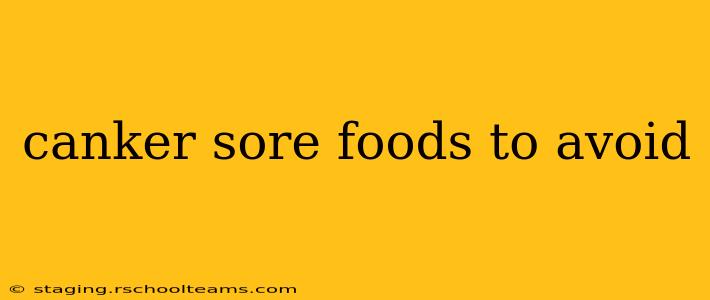Canker sores, those pesky little ulcers that appear inside your mouth, can be incredibly painful and inconvenient. While the exact cause isn't fully understood, certain foods can irritate them, prolonging healing time and increasing discomfort. This guide will help you navigate the often-confusing world of canker sore triggers and identify foods best avoided during a flare-up. We'll also address some frequently asked questions surrounding diet and canker sores.
What Foods Trigger Canker Sores?
Many foods can irritate existing canker sores or even contribute to their development. The most common culprits are acidic, spicy, or hard-to-chew foods. These can physically damage the already sensitive sore or cause a burning sensation. Here's a breakdown of food categories to avoid:
-
Acidic Foods: Citrus fruits (oranges, lemons, limes, grapefruits), tomatoes, pineapple, and even some fruit juices can be particularly harsh on canker sores. Their acidity increases inflammation and pain.
-
Spicy Foods: Chili peppers, hot sauces, and other spicy dishes can irritate the delicate tissue of a canker sore, exacerbating the burning and discomfort. Even mildly spicy foods might be problematic during a flare-up.
-
Hard and Crunchy Foods: Anything that requires significant chewing, such as chips, crackers, nuts, and popcorn, can cause further damage to a canker sore. The abrasive texture can rub against the sore, slowing healing and increasing pain.
-
Salty Foods: While not always a direct trigger for everyone, excessive salt intake can sometimes worsen inflammation and dehydration, potentially exacerbating canker sores.
-
Certain Additives: Some food additives, such as artificial sweeteners and preservatives, can act as irritants for some individuals. Paying attention to your diet and noticing patterns after consuming specific products can help you pinpoint personal triggers.
What About Specific Foods? Are There Any Others I Should Avoid?
Beyond the general categories, specific foods frequently mentioned in relation to canker sore aggravation include:
- Coffee: The acidity and temperature of coffee can be irritating. Consider switching to decaffeinated options or herbal teas during a canker sore outbreak.
- Alcohol: Alcohol can dehydrate the mouth, making canker sores more painful.
- Chocolate: While beloved by many, chocolate contains various compounds that can sometimes worsen inflammation.
- Dairy Products: While not consistently reported as a trigger, some people find that dairy products exacerbate their canker sores.
Can Certain Foods Help Heal Canker Sores?
While focusing on avoiding triggers is crucial, some foods can promote healing:
- Yogurt (Plain, Unsweetened): Provides probiotics which can support gut health and potentially reduce inflammation.
- Soft Foods: Smoothies, mashed potatoes, soups, and other soft foods are easier on the mouth and minimize irritation.
Are There Other Factors Besides Food That Contribute to Canker Sores?
While diet plays a significant role, other factors can also influence canker sore development, including:
- Stress: Stress is a common trigger for many people.
- Hormonal Changes: Fluctuations in hormone levels, especially in women, can sometimes contribute to outbreaks.
- Nutritional Deficiencies: While rare, deficiencies in certain vitamins and minerals (like B vitamins and iron) have been linked to canker sores in some cases.
- Injury: Accidental biting or trauma to the mouth can also initiate a canker sore.
How Can I Prevent Canker Sores?
Preventing canker sores involves a multi-faceted approach:
- Maintain good oral hygiene: Brush and floss regularly.
- Manage stress: Practice stress-reducing techniques like yoga or meditation.
- Eat a balanced diet: Ensure adequate intake of essential vitamins and minerals.
- Avoid known triggers: Identify and avoid your personal food triggers.
By understanding which foods to avoid and incorporating healthy habits, you can significantly reduce the frequency and severity of your canker sores, making those painful mouth ulcers a less frequent concern. If you have persistent or severe canker sores, consult a dentist or doctor for further evaluation and advice.
